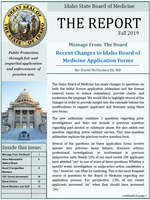Society Commitments - Advocate for Policies that Enhance Physician Well-Being
"Policies and rules at the national level have an effect on physician well-being locally. For example, regulations may influence physician workload and willingness of physicians to access mental health care. Productivity-based reimbursement drives documentation requirements and physician job structure, contributing to increased workload and administrative burden. Policies could better align regulatory and documentation requirements with clinical activity and reduce excessive administrative work through task-sharing among team members. Although licensing organizations must ensure that physicians are fit to practice, physician leaders and organizations could advocate for processes that encourage physicians to seek routine mental health care without fear of licensing penalty."
from the Charter on Physician Well-Being, JAMA. 2018;319(15):1541-1542. doi:10.1001/jama.2018.1331
from the Charter on Physician Well-Being, JAMA. 2018;319(15):1541-1542. doi:10.1001/jama.2018.1331
|
Research, Articles & Ideas
The Board of Medicine ApplicationEvidence shows that doctors nationwide are reluctant to seek help because of questions on the Board of Medicine's licensing application. Similar research was done by Liselotte Dyrbye, et al in 2017 and determined that physician mental health is negatively affected by such question. In 2009, a study showed that up to 69% of state board applications included "likely impermissable" or "impermissable" items based on current Americans with Disabilities Act and case law.
North Carolina Leads the WayIn the Konnfka, et al study cited, North Carolina was the only state achieving a 4/4 rating. Here's their story in Forbes Magazine of how they were successful in addressing this issue, as well as an earlier post on the Western Carolina Medical Society page.
New Mexico is another state that has made apparent progress on this issue, as this case study describes. Idaho Action Collaborative - Prior AuthorizationDr. Deb Roman helped catalyze this group of physicians and administrators from Boise hospital systems, medical clinics, private practices, insurance companies, medical associations and other healthcare organizations in the Summer of 2018. They meet to work together on projects to enhance physician well-being.
Their first project was to identify actionable ways to simplify medication electronic prior-authorization and much progress has been made on this. |
SW Idaho Resources and Examples
Idaho's Board of Medicine Application Revision
In Idaho, ACMS and the IMA were successful in helping prod our state board along to eliminate application questions around mental health that delve further than current impairment. Additionally, if a physician is in current successful treatment for mental health concerns, this does not need to be reported on the new or renewal application.
However, in a 2021 a review of state medical board applications to determine consistency with the 2018 Federation of State Medical Boards' recommendations gave Idaho a 0/4 on their scoring rubric. Dr. Daniel Saddawi-Konefka, the author of the study, corresponded directly with ACMS stating, "Idaho got docked for hypothetical impairment ('that may affect your ability') without any specified timeframe, safe haven nonreporting, or normalizing/supportive language. Separately, at the time, the privacy/disclosure text could also pose a barrier." In 2023, it was confirmed that the questions on both the initial and renewal applications had been changed to be mainly consistant with the Federation of State Medical Board's recommendations. In Idaho, we have been successful in 2018 in helping prod our state board along to eliminate application questions around mental health that delve further than current impairment. Additionally, if a physician is currently successful treatment for mental health concerns, this does not need to be reported on the new or renewal application for licensure. Still, much work remains to be done. Confidentiality Laws for Physician Wellness ProgramsDike Drummond, editor of thehappymd.com blog, cites three states in 2020-2021 who passed legislation to protect the confidentiality of participation in Physician Wellness Programs. These would be different from Physician Health Programs or Physician Recovery Networks that were designed historically to protect licensees while they address impairment issues, typically chemical additions. Here are the following statutes we looked as we hope to be making similar efforts in Idaho.
|